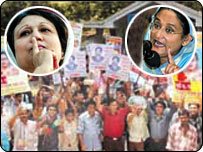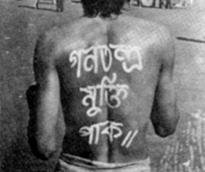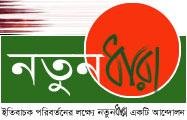BNP 15-pt Reform proposal
Pro-form BNP leaders led by party Secretary General Abdul Mannan Bhuiyan yesterday announced their 15-point reform proposal for the party. Following is the full text of the proposal:
1. The changes that are to be brought in the existing party structure:
a. There are provisions for village councils and village executive committees in Article 1 of Section 6 (a). To be added here: Formation of 31-member ward executive committee.
b. Sub-section a (10) of Article 6 empowers the chairman to nominate 10 per cent of members in all eight stages of leadership, from thana executive committee to the National Standing Committee. This section will be abolished.
c. Section 10 (c) of Article 6 authorises the chairman to nominate different subject committees with members from the National Council, if necessary under circumstances of important national problems. The subject committees may be formed, among others, on the matters concerning national planning and finance, health and population control, rural development, flood control, food and agriculture, eradication of illiteracy, education, labour welfare, women, youth community, international affairs and welfare of children. Experts on different sectors, competent and efficient people, who are not members of the party, could be co-opted in these committees. But, under no circumstances the number of such members should exceed one-third of total members of the committee. Co-opted members will enjoy all other facilities like other members. To be added: The chairman will take approval of national standing committee before nominating the committees. Activities of the committees will be specified.
d. Article 6 (11) mentions that the party chairman will nominate members of the National Executive Committee. This provision will be replaced with the following: Councillors will elect all members of the National Executive Committee.
e. Article 6 (12) states that the national standing committee, nominated by the chairman, will be comprised of 15 members. Instead of this provision, members of national standing committee will be elected through a national council. A person, who is not member of the national executive committee, will not be eligible to become a member of the National Standing Committee.
f. Committees in all strata of the party will be elected through council of respective stages.
2. Article 6 (14) points out that the parliamentary party shall comprise the elected party lawmakers. The parliamentary party shall select its leader, deputy leader, chief whip and other whips after consultation with the party chairman. This provision will be replaced by: Members of the parliamentary party will elect their leader, deputy leader, chief whip and other whips.
3. It is stated about the party chairman's advisory council that there shall be a advisory council comprising 15 members with the status of vice-president for giving advice to the chairman on different issues. But, on special demand the party chairman has the authority to increase the members of the advisory council. They will be nominated by the chairman and will be treated as ex-officio members of the national executive committee.
Instead of this provision, the chairman will be able to appoint advisors on demand with approval of the National Standing Committee and this will have to be approved in the next Executive Committee meeting.
4. Article 8 (a) says that the party chairman shall be elected for a two-year term with common majority of direct votes by the national council members. Anyone can be elected for another tenure after completing the term. The following provisions will replace this provision:
8 (a) (1): Party chairman will be elected for a three-year term winning common majority votes of the members of the national council.
(2) No one can continue as chairman for more than two terms or six years. This provision will also be applicable for those who have been already in the post for two terms or more than six years in the aforesaid post.
5. The elected prime minister will run operations in government and parliament in consultation with the party's chairman and National Standing Committee on policy issues.
6. If elected the prime minister twice, a person can no longer be the prime minister or the party chairman.
7. In sections 1,2,3,4 of 8 (b), it is mentioned that (1) as the party's highest official, the chairman will control, supervise and coordinate all party affairs, and to that end, will officiate over the national council, National Standing Committee, National Executive Committee, subject committees and other committees nominated by the chairman, and will control, supervise and coordinate their operations. (2) The chairman can also take punitive measures against members of the aforementioned committees if necessary. (3) As the president of the mentioned committees, the chairman will also assign the committee members' responsibilities, power and duties. (4) If he/she thinks necessary, the chairman can dissolve the National Executive Committee, National Standing Committee, subject committees and other committees nominated by the chairman.
8. Section 13 of Chapter 6 states: There shall be a parliamentary board to nominate candidates for national parliamentary elections or any other elections. The party's Standing Committee shall be the party's parliamentary board. But, when a district's candidate is asked to appear before the parliamentary board, that district's party president, first three vice-presidents, and general secretary will be considered as members of the parliamentary board. But, if a member of the parliamentary board runs for election, he cannot be present at the meeting when the candidate nomination for their constituency is being decided. The party chairman will be the parliamentary board president. The parliamentary board will serve to nominate the candidate for national parliamentary elections or any other elections and their decisions shall be considered final.
To be added: Measures are to be taken to reflect the wishes of the leaders and workers from the constituencies.
9. Council of all the committees must be completed by the time allocated by the party constitution.
10. The party treasurer will collect the organisation's funds and maintain its accounts. A bank account shall be opened in any commercial bank and the account shall be operated with the joint signatures of two among the president, treasurer and the general secretary, but one of the signatures must be of the treasurer. An audit of the party's account must be held annually, and the audit report has to be published within six months of the completion of a fiscal year. The party's fund will be created through the donations and grants of members.
To be added: All donations will be acknowledged with a receipt. All income and expenditures of all organisational units will also be annually audited for the fund's transparency. A specific guideline must be drawn up to collect funds and the fund's maintenance must adhere to the rules and regulations set by the standing committee. An annual budget must be prepared and all income and expenditure accounts presented before each meeting.
11. Party ministers, MPs, Standing Committee members, Executive Committee members, subject committee members, district committee members, and thana committee members will have to submit their annual wealth statements to the National Executive Committee.
12. The inclusion of family members and close relatives of leaders on all levels of the party must be discouraged.
13. Section 2 of the Article mentions that if required in case of an emergency the party chairman can make a change to the party constitution, but the decision must be accepted at the next meeting of the national council as described in Section A.
This section will be cancelled.
14. The candidates' wealth statements must be submitted to the party during all nominations, and on behalf of the party, a committee will determine their veracity.
15. The reform programmes that the Election Commission will undertake through discussion with the political parties will be adjusted with the party constitution.









